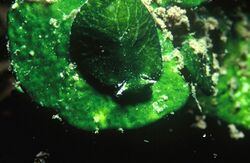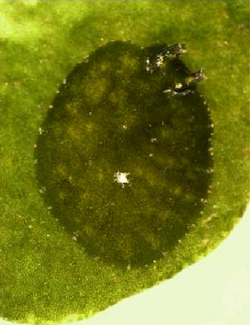Biology:Bosellia mimetica
| Bosellia | |
|---|---|

| |

| |
| Bosellia mimetica on Halimeda tuna. Locality: Mediterranean Sea. The length of the slug is about 1 cm. | |
| Scientific classification | |
| Kingdom: | Animalia
|
| Phylum: | Mollusca
|
| Class: | |
| (unranked): | |
| Superfamily: | |
| Family: | Boselliidae
|
| Genus: | |
| Species: | B. mimetica
|
| Binomial name | |
| Bosellia mimetica Trinchese, 1890
| |
Bosellia mimetica is a species of sea slug, a marine gastropod mollusk in the family Boselliidae. It is a very small sea slug growing to less than 1 centimetre (0.4 in) in length. It has a rounded, flattened body and is a mottled green, a colour that mimics that of the algae Halimeda tuna and Flabellia petiolata on which it lives and feeds.[1]
The type locality is the island of Capri, in Italy.[2]
Description
Bosellia mimetica is a very small sea slug and seldom exceeds 8 millimetres (0.3 in) in length. When at rest, its body is an oval shape but when moving it extends its body, resembling a grain of rice. The body has a flap on either side but there are no true parapodia. The colour is a shade of green which resembles the colour of the Halimeda algae on which it feeds. Individuals feeding on the underside of the fronds tend to be paler than those on the upper surface. There are often linear white markings that resemble the white worm tubes often present on the fronds. The two rhinophores are smooth and are slightly paler in colour than the ground colour.[3]
Distribution
Bosellia mimetica is found in shallow water in the Mediterranean Sea, on the Atlantic coast of Spain , in the Caribbean Sea and south to Brazil .[1]
Ecology
This sea slug is exclusively vegetarian and seems to feed only on Halimeda and Flabellia petiolata. The chloroplasts that are ingested when the algae is consumed are stored in the walls of branches of the digestive gland. There they remain active for up to 45 days and give the slug its colour. The carbohydrates produced by the chloroplasts during photosynthesis contribute to the slug's nutritional needs.[3]
References
- ↑ 1.0 1.1 Bosellia mimetica Trinchese, 1890 The Sea Slug Forum. Retrieved 2012-01-22.
- ↑ Jensen K. R. (November 2007). "Biogeography of the Sacoglossa (Mollusca, Opisthobranchia)" . Bonner zoologische Beiträge 55(2006)(3-4): 255–281.
- ↑ 3.0 3.1 Meyer, Frédéric; Oms, Robert (7 January 2021). "Bosellia mimetica Trinchese, 1891" (in French). DORIS. https://doris.ffessm.fr/ref/specie/1924.
External links
- Photos of Bosellia mimetica on Sealife Collection
Wikidata ☰ Q2911455 entry
 |

